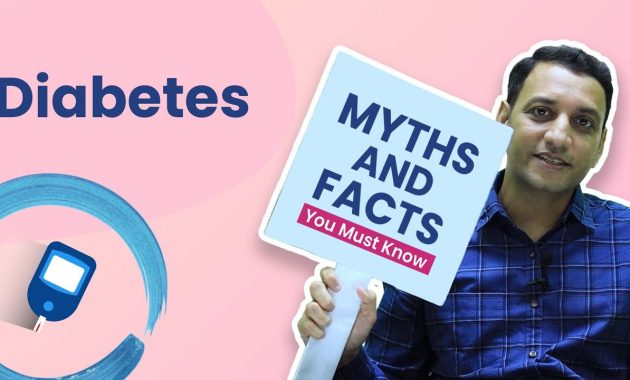
Diabetes Myth vs Fact: Separating Truth from Fiction for Better Health
Diabetes. The word itself can conjure images of restrictive diets, endless doctor visits, and a life perpetually marked by managing blood sugar levels. But how much of what we *think* we know about diabetes is actually true? In a world saturated with information, it’s easy to fall prey to myths and misconceptions that can hinder effective diabetes management and, in some cases, even endanger health. This article delves into the common diabetes myths versus facts, providing clarity and empowering readers with the knowledge they need to navigate this complex condition. We will be exploring the diabetes myth versus fact landscape.
Understanding the difference between diabetes myth vs fact is crucial for anyone affected by the disease, whether they have been diagnosed or are simply at risk. It’s not just about knowing what to eat or what medications to take; it’s about understanding the very nature of the illness. The goal is to dispel the misinformation and empower readers with accurate information about diabetes myth vs fact.
Diabetes Myth vs Fact: Dietary Dilemmas
Dietary choices are at the heart of diabetes management. Consequently, the myths surrounding food and diabetes are abundant. Let’s debunk some of the most prevalent ones.
Myth: People with diabetes can’t eat sugar.
Fact: This is a pervasive misconception. While it’s true that excessive sugar intake can impact blood sugar levels, people with diabetes can consume sugar in moderation. The key is to focus on the total carbohydrate intake and the impact of different foods on blood sugar. A balanced diet that includes complex carbohydrates, lean proteins, and healthy fats is essential. Portion control is also crucial. Understanding this diabetes myth vs fact is very important.
Myth: All carbohydrates are bad for people with diabetes.
Fact: Not all carbohydrates are created equal. Simple carbohydrates, like those found in sugary drinks and processed foods, can cause rapid spikes in blood sugar. Complex carbohydrates, such as whole grains, fruits, and vegetables, are digested more slowly and provide essential nutrients. These should form the foundation of a diabetes-friendly diet. The diabetes myth vs fact discussion is vital here.
Myth: Eating a lot of fruit is bad for diabetes.
Fact: Fruits contain natural sugars, but they also provide fiber, vitamins, and minerals. The fiber helps slow down the absorption of sugar, and the nutrients are beneficial for overall health. Moderation is key, and choosing fruits with a lower glycemic index (GI) is often recommended. This is a key element to the diabetes myth vs fact conversation.
Diabetes Myth vs Fact: Exercise and Lifestyle
Beyond diet, lifestyle choices play a significant role in diabetes management. Let’s clarify some common misconceptions about exercise and lifestyle.
Myth: Exercise is only for weight loss.
Fact: Exercise is incredibly beneficial for people with diabetes, even if weight loss isn’t the primary goal. Physical activity helps improve insulin sensitivity, which means the body can use insulin more effectively. It also helps control blood sugar levels, improves cardiovascular health, and boosts overall well-being. This is a crucial component of the diabetes myth vs fact discussion.
Myth: People with diabetes can’t exercise.
Fact: Unless a doctor advises otherwise, most people with diabetes can and should exercise. It’s important to consult with a healthcare provider before starting a new exercise program, especially if there are other health complications. Exercise should be tailored to individual needs and abilities. This underscores the importance of the diabetes myth vs fact topic.
Myth: Diabetes is caused by eating too much sugar.
Fact: While a diet high in sugar can contribute to weight gain and insulin resistance, the causes of diabetes are more complex. Type 1 diabetes is an autoimmune disease, and type 2 diabetes is often influenced by genetics, lifestyle, and other factors. This highlights the nuances in the diabetes myth vs fact debate.
Diabetes Myth vs Fact: Treatment and Management
Treatment and management strategies are constantly evolving, and misconceptions abound. Let’s address some of the most common ones.
Myth: Diabetes is a death sentence.
Fact: Diabetes is a serious condition, but it is manageable. With proper medical care, lifestyle adjustments, and adherence to treatment plans, people with diabetes can live long and healthy lives. Advances in medicine have significantly improved diabetes management. The diabetes myth vs fact discussion can change perceptions.
Myth: Insulin is a last resort treatment.
Fact: Insulin is a life-saving medication for people with type 1 diabetes and may be necessary for some individuals with type 2 diabetes. It’s not a sign of failure or that the disease has worsened. Insulin is a crucial tool for managing blood sugar levels and preventing complications. This is an essential point in the diabetes myth vs fact dialogue.
Myth: Diabetes can be cured.
Fact: Currently, there is no cure for diabetes. However, type 2 diabetes can sometimes go into remission with significant lifestyle changes, such as weight loss and exercise. Ongoing research explores potential cures, but for now, the focus is on effective management. The diabetes myth vs fact conversation helps with realistic expectations.
Myth: People with diabetes can’t drive.
Fact: People with diabetes can drive, but they need to manage their blood sugar levels to prevent hypoglycemia (low blood sugar) while driving. They must also meet certain medical requirements. This is another critical aspect of the diabetes myth vs fact discussion.
Diabetes Myth vs Fact: The Role of Technology
Technology is playing an increasingly important role in diabetes management. Let’s clear up some misconceptions about technology and diabetes.
Myth: Technology replaces the need for lifestyle changes.
Fact: Technology, such as continuous glucose monitors (CGMs) and insulin pumps, can be valuable tools for managing diabetes. However, they don’t replace the need for healthy eating, regular exercise, and other lifestyle adjustments. Technology supports these efforts. This is an important nuance in the diabetes myth vs fact discussion.
Myth: Technology is only for people with type 1 diabetes.
Fact: While technology is often used by people with type 1 diabetes, it can also be helpful for people with type 2 diabetes. CGMs and insulin pumps can provide valuable insights into blood sugar patterns and help fine-tune treatment plans. This demonstrates the evolving nature of the diabetes myth vs fact dynamic.
Diabetes Myth vs Fact: The Importance of Education
Education is key to effectively managing diabetes. It empowers individuals to make informed decisions about their health. Understanding the difference between diabetes myth vs fact is a crucial first step.
Myth: You can rely solely on your doctor for all information.
Fact: While your doctor is an invaluable resource, actively seeking information and learning about diabetes is essential. There are numerous reputable sources of information, including certified diabetes educators, online resources, and support groups. This highlights the importance of the diabetes myth vs fact knowledge.
Myth: Diabetes education is a one-time event.
Fact: Diabetes education is an ongoing process. As new information emerges and treatment options evolve, it’s important to stay informed. Regular check-ins with healthcare providers and participation in educational programs can help individuals stay on top of their diabetes management. This emphasizes the continuous learning aspect of the diabetes myth vs fact journey.
Living Well with Diabetes
Living with diabetes requires a proactive approach, but it doesn’t have to be a burden. By understanding the facts, dispelling the myths, and embracing a healthy lifestyle, people with diabetes can thrive. This means focusing on a balanced diet, regular exercise, consistent blood sugar monitoring, and open communication with healthcare professionals. The diabetes myth vs fact conversation is a starting point.
Remember that every individual’s experience with diabetes is unique. What works for one person may not work for another. Therefore, it’s important to work closely with your healthcare team to develop a personalized management plan that meets your specific needs. The diabetes myth vs fact knowledge allows for better patient-doctor collaboration.
Embrace the journey of learning and self-management. With the right knowledge and support, people with diabetes can live long, healthy, and fulfilling lives. By understanding the diabetes myth vs fact landscape, you are better equipped to manage your health.
[See also: Related Article Titles]

